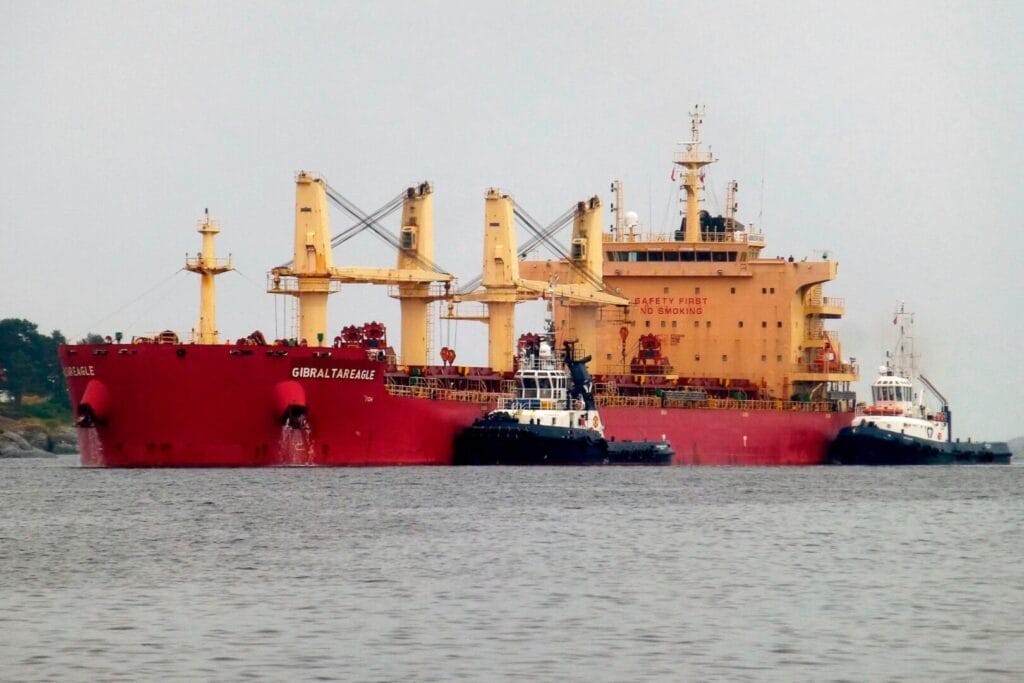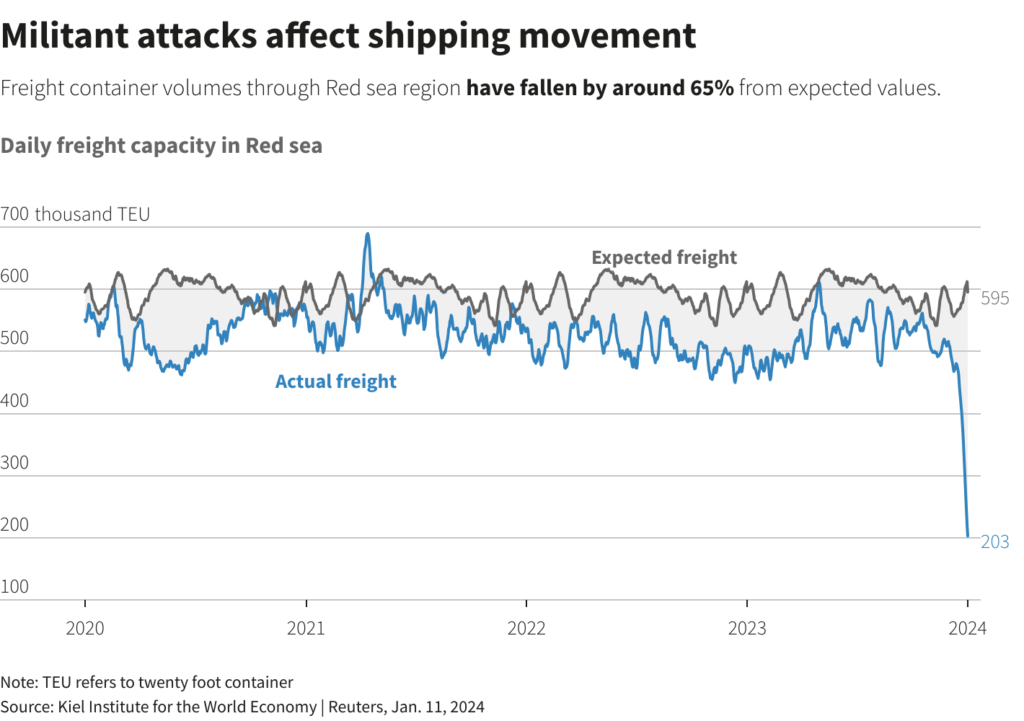Yesterday U.S. Central Command (CENTCOM) reported that a Houthis, who the U.S. continues to emphasize is backed by Iran, struck a U.S.-owned commercial vessel.

In response, the U.S. hit back with their own strikes today around midday, which in turn rattled the markets. Typically retaliatory strikes such as these happen near or after the closing bell as not to gyrate markets too much. CENTCOM said in a press release:
On Jan. 16 at approximately 1:45 p.m. (Sanaa time), Iranian-backed Houthi militants launched an anti-ship ballistic missile from Houthi-controlled areas of Yemen into international shipping lanes in the Southern Red Sea. M/V Zografia, a Maltese flagged bulk carrier, reported they were struck, but seaworthy, and were continuing their Red Sea transit. No injuries were reported.
Additionally, following the Jan. 15 attack on the M/V Gibraltar Eagle, a Marshall Islands-flagged, U.S.-owned and operated container ship, on Jan. 16 at approximately 4:15 a.m. (Sanaa time), U.S. Forces struck and destroyed four Houthi anti-ship ballistic missiles. These missiles were prepared to launch from Houthi-controlled areas of Yemen and presented an imminent threat to both merchant and U.S. Navy ships in the region.
Moreover, CENTCOM also reported that U.S. forces seized Iranian weapons that purportedly were to be sent to supply the Houthis. This is the first such type of seizure since conflicts with the Yemen-based militia began in December. They wrote:
“U.S. Navy SEALs operating from USS Lewis B Puller (ESB 3), supported by helicopters and unmanned aerial vehicles (UAVs), executed a complex boarding of the dhow near the coast of Somalia in international waters of the Arabian Sea, seizing Iranian-made ballistic missile and cruise missiles components. Seized items include propulsion, guidance, and warheads for Houthi medium range ballistic missiles (MRBMs) and anti-ship cruise missiles (ASCMs), as well as air defense associated components. Initial analysis indicates these same weapons have been employed by the Houthis to threaten and attack innocent mariners on international merchant ships transiting in the Red Sea.”
It is clear that Iran continues shipment of advanced lethal aid to the Houthis. This is yet another example of how Iran actively sows instability throughout the region in direct violation of U.N. Security Resolution 2216 and international law. We will continue to work with regional and international partners to expose and interdict these efforts, and ultimately to reestablish freedom of navigation.
said General Michael Erik Kurilla
In December The WinePress highlighted how these skirmishes are creating global trade distortions, as many shipping companies and freighters are changing their routes to avoid being attacked, but means that the supply of goods and resources are taking much longer than usual. Now the effects are getting worse.
Nearly 12% of world shipping traffic utilizes the Suez Canal via the Red Sea.
The Trends Journal reported that inflation may go higher because the shipping costs have forcibly risen.
To avoid attacks, shipments from Asia to the West are avoiding the Suez Canal and rerouting around Africa’s southern tip, a detour that can add as much as 20 days to a trip. Some retailers are reporting a 10- to 14-day lag in receiving their shipments.
The additional time translates to additional costs for fuel, insurance, crew time, and other operating expenses.
As a result, the price to send a loaded 40-foot container from northern Asia to the U.S. East Coast has leaped 137 percent to $5,100 since early October, according to S&P Global. The same container sailing from northern Asia to the U.S. West Coast has reached $3,700, a 131-percent increase.
The TJ explained

Germany’s Kiel Institute for the World Economy also noted that roughly 200,000 cargo containers are transiting the Red Sea daily, versus the 500,000 before the war began in October.
Analysts at JP Morgan wrote: “Renewed increases in global shipping costs could add to consumer price inflation over the next several months, should these increases pass through to higher final goods prices. Such an outcome would reinforce our expectation for progress on reducing core inflation to stall this year.”
While at the World Economic Forum meeting in Davos, Switzerland, today, freight operator DP World CFO Yuvraj Narayan explained that this will draw costs higher especially for Europe.
The cost of goods into Europe from Asia will be significantly higher.
European consumers will feel the pain … It will hit developed economies more than it will hit developing economies,
He told Reuters
The situation has also effected Chinese shipping, and now Beijing is demanding that hostilities cease.
The situation in the Red Sea has escalated sharply recently, and China is deeply concerned about this. China calls for a halt to the harassment and attacks on civilian ships and for the maintenance of the smooth flow of global industrial and supply chains and the international trade order.
Chinese Foreign Minister Wang Yi said, according to Asia-Nikkei
See more additional insights below:
AUTHOR COMMENTARY
The earth is moved at the noise of their fall, at the cry the noise thereof was heard in the Red sea.
Jeremiah 49:21 – obviously this is referring to something else, but you get the point
It would seem only inevitable at this point that this war will continue to expand, and drive the prices of everything up higher. Remember the old adage: all wars are banker wars; and, as we know, “the love of money is the root of all evil.” There is a lot more to this than meets the eye. Don’t fall for the media hype on either side…
[7] Who goeth a warfare any time at his own charges? who planteth a vineyard, and eateth not of the fruit thereof? or who feedeth a flock, and eateth not of the milk of the flock? [8] Say I these things as a man? or saith not the law the same also? [9] For it is written in the law of Moses, Thou shalt not muzzle the mouth of the ox that treadeth out the corn. Doth God take care for oxen? [10] Or saith he it altogether for our sakes? For our sakes, no doubt, this is written: that he that ploweth should plow in hope; and that he that thresheth in hope should be partaker of his hope. (1 Corinthians 9:7-10).
The WinePress needs your support! If God has laid it on your heart to want to contribute, please prayerfully consider donating to this ministry. If you cannot gift a monetary donation, then please donate your fervent prayers to keep this ministry going! Thank you and may God bless you.







